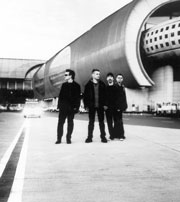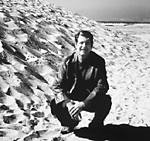A STRANGE MOMENT at the Brit awards in London last month: At the end of a faultlessly hip procession of modern pop, we were treated to a closing act so lumbering it might have been out of the Jurassic period. Amidst the bright, cheerful young faces, U2 was suddenly doing what all grown-up bands have to do these days—accepting a Lifetime Achievement award while desperately promoting a rotten new single. There they were mucking about on stage with Robbie Williams and all the other grinning guest stars, yet U2 also gets to trek round the world, have hit albums, and generally be global icons. After 20-odd years on the boards, Bono & Co. are enjoying both a revival and, let’s face it, an identity crisis. The muse may have gone south for the band somewhere around the second Reagan administration but, like a Dylan or Bowie, they’ve made a virtue of fickleness, cannily reinventing themselves a nose ahead of their own obsolescence. To be given an award as honorary Brits is just another of life’s contradictions for Ireland’s most famous export, alongside Riverdance and Guinness.
U2, PJ Harvey
Tacoma Dome, Thursday, April 12
Then again, paradox is somewhere U2 has always felt at home. They’re the punks from Dublin in love with Americana; the rockers who hang loose with the Pope; the band who’ve covered the waterfront from new wave to anthemic torch songs to techno and back again to traditional guitar benediction. Nine people turned up to see them at a pub in London in 1982. Five years later, U2 was mega-touring behind The Joshua Tree, their sincerity and audience identification compared to Bruce Springsteen’s.
In contrast to the Boss’, the band’s music in those days was laced with soaring riffs and layered, choirboy harmonies, with Brian Eno giving it that extra radio sheen. The overall quality of the tunes was impressive enough. But The Joshua Tree bristled with unexpected touches. On the debit side were almost all Bono’s lyrics, mixing greeting-card pleas for world peace and Gaelic-lite idiom with a song cycle of clich餠sub-Nebraska dirges. More engaging were the deft musical quirks: the Edge’s trippy guitar fills, Eno’s one-finger synths, Bono’s tonsils. Add gigs that became giant power-aerobics classes, with a P.A. that could make the stage jump up and down the block, and it’s easy to see how U2 became the best-loved retail rockers since the Stones.
The Madonna-like reconstructions began almost immediately, from Rattle & Hum through 1997’s dire Pop. Ambient riffs, ghostly pianos, piston-hissing noises, all seemingly belonged to a different sonic world to that occupied by, say, The Unforgettable Fire. The gigs, too, turned knowingly postmodern. Bono, who could still sing everyone else off stage, also spent his time gabbing ironically to the audience. It was rock ‘n’ roll for people who were weary of rock ‘n’ roll. “Look,” it said, “Everything is fake, it’s all just vibrations amplified through big boxes, let’s not bother pretending.”
CLEARLY, ONE OF BONO’S major attractions is that he’s an homme serieux—fronting Jubilee 2000, the campaign to reduce Third World debt—who finds at least part of his day job ridiculous. All the hammy quick-changes and alter egos have more in common with vintage Zappa than with the fossilized ravings of a Rod or Elton. Discerning fans, quite naturally, respond to this sort of self-parody. And they appreciate the fact that, when he’s not busy camping it up, one eyebrow permanently arched, Bono still gives equal time to the subtler side of his singing and songwriting. Both are, of course, sublime, building on U2’s acknowledged mastery of baroque ’60s folk-rock by raiding a seemingly infinite cupboard of influences. The tunes are, indeed, unforgettable in one sense: melodies so spot-on that you feel sure someone must have written them before.
Conversely, the dreaded intro “Here’s one off the new album” loses some of its stampede-inducing terror when heard at a U2 gig. On All That You Can’t Leave Behind, the band’s effectively time-traveled back to the mid-’80s, with Eno on board again and a rootsy, folksy, sometimes bluesy sound. Yes, it’s formulaic and, yes, the power pop merely makes you nostalgic for The Joshua Tree, but it still leaves a Just Push Play far behind in the rearview mirror.
What we have, then, is a band too fast for officially tolerated Old Fart status and too successful for anything fresh, let alone new—a curious niche in the rock ‘n’ roll firmament. I wanted to like All That You Can’t Leave Behind less than I did. For one thing, after gracing the Brits, the Grammys, the Hall of Fame, the Oscars, and just about everything else with a stage, Bono, like God, suddenly seems to be everywhere. But if the overkill grates, the predictability of the band’s songs somehow makes them better. Listen to “Beautiful Day” or “Stuck in a Moment,” a cut perhaps too cleverly titled for its own good: All the old U2 swagger is present and correct. It may not be original, but resistance does prove futile.







